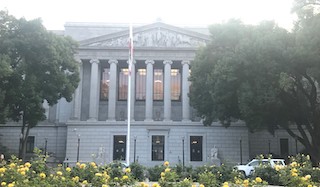Throughout the first half of 2014, Nathan Philbrook and Daniel Devencenzi stole marijuana from multiple marijuana farms and greenhouses that Philbrook’s wife helped locate on Google Earth, which provides aerial views of land throughout the world.
In July, 2014, Philbrook invited Finley Fultz to a marijuana theft with him and Devencenzi. Fultz accepted the invitation. He, Philbrook and Devencenzi then drove to a farm in two cars, with Devencenzi following Fultz and Philbrook driving together. Just after midnight, the group approached a greenhouse that Philbrook and Devencenzi had stolen marijuana from about a week before.
Why This Article Matters: If a plea bargain requires that a defendant later testify against a co-defendant at trial, that is illegal. The plea bargain instead may obligate that defendant testify truthfully at a later trial.
Philbrook entered the greenhouse through a backdoor while Devencenzi stayed outside. Fultz went to the front of the greenhouse.
Isaac Zaft was asleep on the greenhouse floor, but awoke to see Philbrook and the laser sight of his AR-15 style gun. Zaft ran out the front door of the greenhouse where Fultz was located. Fultz shot Zaft five times with an AR-15 and Zaft died. His body was found at approximately 3:00 a.m.
The group then fled back to Nevada, all the while Philbrook and Devencenzi used their cell phones.
When they returned to Nevada, Fultz admitted to Philbrook’s wife that he shot someone, who apparently died and Philbrook corroborated this.
Several months later, Philbrook’s wife supplied an anonymous tip to the Washoe County Sheriff’s Department in the state of Nevada about the murder. She then agreed to three interviews, during which time she identified Philbrook, Devencenzi and Fultz as being responsible for the murder. Fultz was then arrested.
Later, it was discovered that the Sheriff’s Department had lost the recordings of one of the interviews, but had relied upon it in issuing subpoenas and in arresting Fultz, as well as Philbrook and Devencenzi by using a “data dump” from Philbrook and Devencenzi’s cell phones to place them not only at the murder scene, but to corroborate the tip and interviews from Philbrook’s wife that Philbrook and Devencenzi were continuously calling each other before and after the murder.
While Fultz was in jail, police placed an undercover police officer in Fultz’s cell for the purpose of eliciting incriminating statements from him concerning the murder, violating his Fifth and Sixth Amendment right to counsel.
Eventually, Philbrook and Devencenzi were also arrested and charged as well and prosecutors arranged for plea deals with each, wherein they agreed to testify to specific facts at trial against Fultz.
 Court of Appeal Third Appellate District Sacramento
Court of Appeal Third Appellate District Sacramento
At the trial of Fultz, the judge dismissed the case, finding there was no possibility he could receive a fair trial considering the nature of the evidence against him and the constitutional violations surrounding his accomplices’ pleas and interviews.
The People appealed this dismissal. This article, as the Third Appellate District characterized the case, “concerns the level of gamesmanship the prosecutor can engage in during a criminal prosecution before that gamesmanship is so unconstitutional the pending murder charge against a defendant must be dismissed because no fair trial could possibly be held.”
The Third Appellate District Court reminded the reader that “[T]he standard for dismissal is high.” United States v. Morrison (1981) 449 U.S. 361, 365, 66 L. Ed. 564, 568-569 [“Our approach has thus been to identify and then neutralize the taint by tailoring relief appropriate in the circumstances to assure the defendant the effective assistance of counsel and a fair trial. The premise of our prior cases is that the constitutional infringement identified has had or threatens some adverse effect upon the effectiveness of counsel’s representation or has produced some other prejudice to the defense. Absent such impact on the criminal proceeding, however, there is no basis for imposing a remedy [of dismissal] in that proceeding, which can go forward with full recognition of the defendant’s right to counsel and a fair trial.”’
The trial court found that the plea deals to Philbrook and Devencenzi, obligating them to testify to specific facts, tainted their testimony beyond redemption. People v. Medina (1974) 41 Cal. App. 3d 438, 449-456 (using coerced testimony violates a fundamental right to a fair trial).
The Third Appellate District found that the trial court erred in this regard and remanded the case back to the Nevada County Superior Court to neutralize the taint resulting from the prosecutor’s misconduct.
The Third Appellate District held that the trial court could still have a fair trial as long as the plea bargains to Philbrook and Devencenzi only obligated each defendant to testify fully and truthfully, rather than to specific testimony that might have been coerced.
The citation for the Third Appellate District Court ruling discussed above is People v. Finley Fultz (3rd App. Dist., 2021) 69 Cal. App. 5th 395, 284 Cal. Rptr. 3d 515.
For more information about contempt proceedings for refusing to testify and the right to remain silent, please click on the following articles:
 Court of Appeal Third Appellate District Sacramento
Court of Appeal Third Appellate District Sacramento